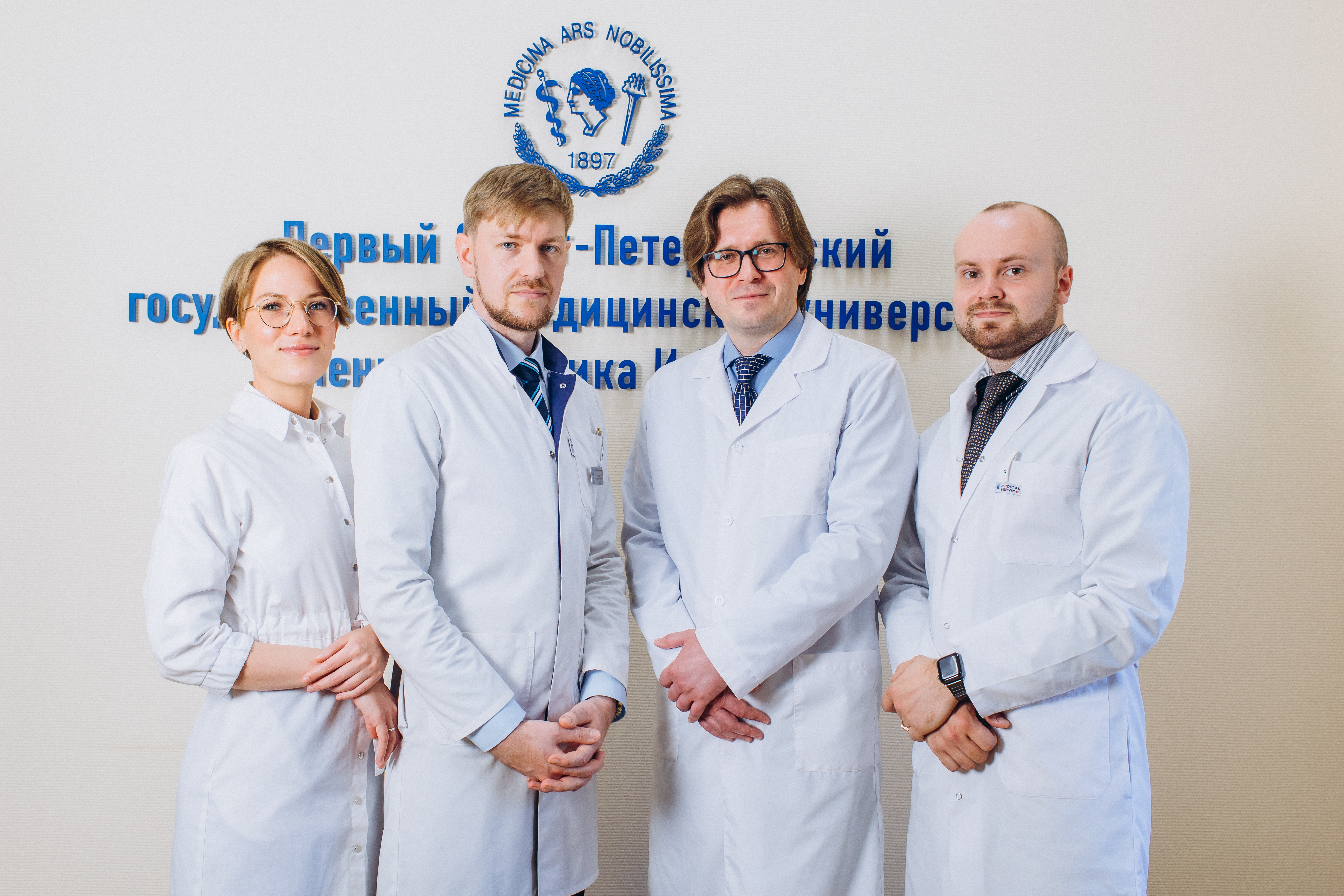Contact Information:
Phone : +7(812) 338 69 76
Е-mail : AHSCT1spbgmu@yandex.ru , terapia.aiz@yandex.ru
Address: St. Petersburg, Leo Tolstoy str., 17, building 54, 5th floor, Research Institute of Nephrology
About us in the media
Dr. Pi ter. In St. Petersburg, patients with multiple sclerosis are treated with stem cells and chemotherapy
We specialize in the treatment of autoimmune and oncological diseases, we have many years of experience in a multidisciplinary hospital.
The department's specialists diagnose and treat the following diseases:
- Neurological diseases
- Multiple sclerosis
- Opticoneuromyelitis (Devic's disease)
- Chronic inflammatory demyelinating polyneuropathy (CIDP)
- Neuro-muscular diseases
- Lymphomas (Hodgkin and non-Hodgkin)
- Multiple myeloma, AL-amyloidosis
- Systemic connective tissue diseases
- Systemic lupus erythematosus (SLE)
- Inflammatory myopathies (polymyositis / dermatomyositis)
- Systemic scleroderma (SS)
- Sjogren's disease
- Systemic vasculitis
- Rheumatoid arthritis
- Rheumatoid vasculitis
- Behcet's disease
- Systemic ANCA-associated vasculitis:
1.granulomatosis with polyangiitis
2.eosinophilic granulomatosis with polyangiitis
3.microscopic polyangiitis - Temporal arteritis
- Antiphospholipid syndrome
- Autoimmune diseases of the gastrointestinal tract
- Crohn's disease of mild to moderate activity
- Overlap syndromes (eg, SLE + CC) and others
The department specializes in:
- high-dose immunosuppressive therapy followed by autologous hematopoietic stem cell transplantation . HDIT-AHSCT is a highly effective and fairly safe method of treating autoimmune diseases. Studies have shown an almost 90% reduction in the frequency of exacerbations compared to the pre-transplant period. The recurrence-free course of patients after HDIT-AHSCT today in some cases reaches 20 years, and the total efficiency for all subtypes of multiple sclerosis is estimated at 75-95%. The average duration of treatment is 30 days.
- polychemotherapy of varying types of intensity . When performing PCT (for example, R-CHOP, CHOEP, ABVD, BEACOPPesc) of the 1st line, the duration of hospital stay is in average 1-5 days, when intensive modes of PCT (ICE, DHAP, IGEV) are used, the duration of treatment can take 10-14 days ...
- targeted therapy (monoclonal antibodies, tyrosine kinase and checkpoint inhibitors) for cancer and autoimmune diseases. This procedure can be carried out as part of a day hospital; the duration of treatment can be 1-3 days.
- adjuvant therapy for oncological diseases, including transfusion of erythrocyte suspension and thrombocyte concentrate for subsequent safe chemoimmunotherapy. The duration is 1-2 days.
The department consists of specialists with experience in performing allogeneic HSCT in oncological and hematological diseases, autologous HSCT in autoimmune, neurological diseases, including repeated transplantations, as well as in targeted therapy followed by dynamic observation, prevention and treatment of complications of high-tech care in special categories patients.
Department specialists:
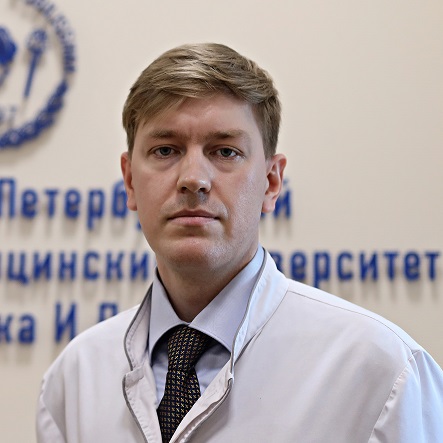 Polushin Alexey
Polushin Alexey
Head of Department of the Chemotherapy and HSCT for Cancer and Autoimmune Diseases, associate professor, Ph.D.
Graduated from the Military Medical Academy named after S.M. Kirov (MMA) in 2008. Postgraduate education in neurology (internship, residency, 2008-2011 – VmedA MMA). Since 2010 he has been working as a neurologist (2011 I.I.Dzhanelidze Research Institute of Emergency Medicine, 2010-2017 Clinic of Neurology of the Military Medical Academy, since 2017 in Raisa Gorbacheva Memorial Research Institute of Children Oncology, Hematology and Transplantation of Pavlov First St. Petersburg State Medical University(Pavlov University). In 2013 he defended his Ph.D. thesis on the topic "Monitoring of cerebral blood flow in different subtypes of ischemic stroke." Since 2014, he has been teaching as an assistant at the Department of Neurology (MMA (2014-2017), Pavlov First St. Petersburg State Medical University since 2017).
Research interests: neurological complications after allogeneic HSCT and the use of checkpoint inhibitors of control immune points in malignant hematological diseases; long-term consequences of autologous transplantation with AID; the effectiveness of HDIT conditioning regimens in multiple sclerosis and other autoimmune diseases; the problem of relapse after all therapies for multiple sclerosis. Pharmacological and non-drug treatment of patients after HDIT-AHSCT.
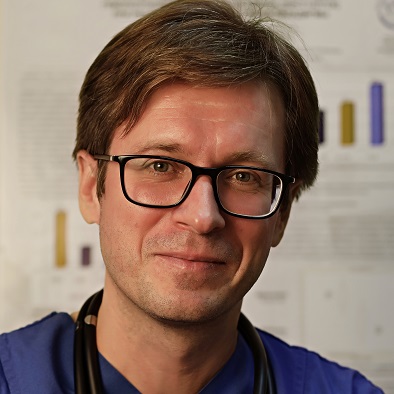 Zalyalov Yuri
Zalyalov Yuri
Head of the Unit for Chemotherapy and TSC for Cancer and Autoimmune Diseases, Ph.D.
Graduated from Lugansk State Medical University in 2002. In 2004 he graduated from residency in therapy and rheumatology at the Department of Therapy No. 1 of Medical Academy of Post-graduate education. At the Department of Hematology, Transfusiology and Transplantology of Pavlov University he defended his Ph.D. thesis on the topic: "The role of ATG in increasing the efficiency of allogeneic hematopoietic stem cell transplantation." Since 2007 he has been working as a hematologist at Raisa Gorbacheva Memorial Research Institute of Children Oncology, Hematology and Transplantation. From 2016 to 2020, he was the Head of Department of Oncology No. 2 (chemotherapy and bone marrow transplantation) at Raisa Gorbacheva Memorial Research Institute of Children Oncology, Hematology and Transplantation.
Research interests: immunological mechanisms of pathogenesis of autoimmune diseases, study of the mechanisms of "plasticity" of various subpopulations of lymphocytes, targeted therapy in various oncological, oncohematological and autoimmune diseases.
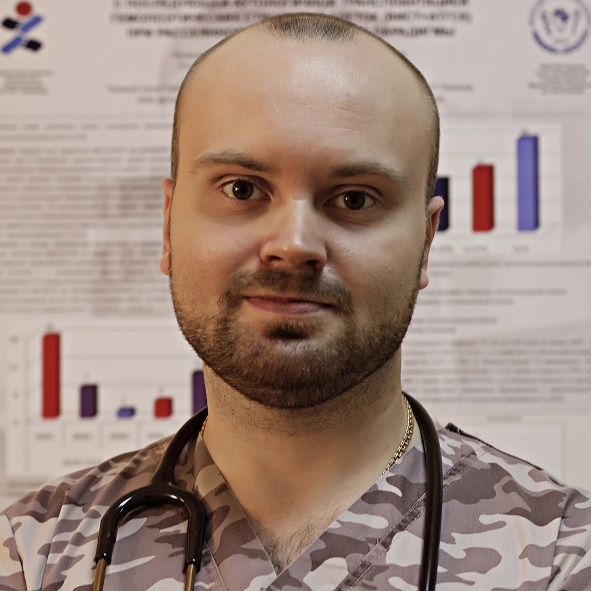 Tsynchenko Alexander
Tsynchenko Alexander
Hematologist of the chemotherapy and HSCT unit for cancer and autoimmune diseases.
Graduated from Pavlov First St.Petersburg State Medical University. He completed his residency in hematology at the Almazov National Medical Research Centre (St. Petersburg).
Research interests: development of new approaches and principles of therapy for various autoimmune diseases. Cellular and molecular genetic mechanisms of regulation of processes of activation, differentiation and self-maintenance of immune memory. Multiparametric studies of the pathogenesis of autoimmune diseases at the cellular, molecular genetic levels.
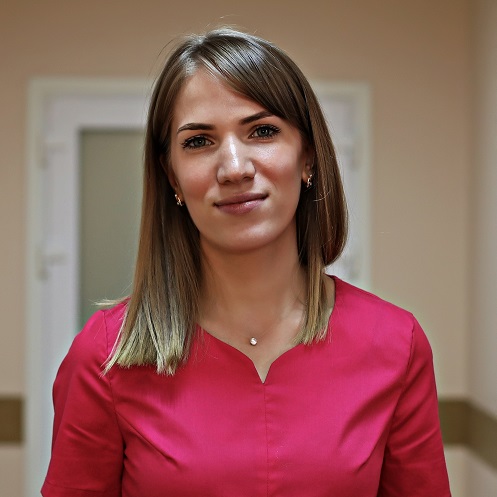 Kakoulina Evgeniya
Kakoulina Evgeniya
Neurologist at the chemotherapy and HSCT unit for cancer and autoimmune diseases.
In 2018 she graduated from the St. Petersburg State Pediatric Medical University with a degree in Pediatrics. Completed residency in neurology at the Military Medical Academy named after S.M. Kirov.
Research interests: toxic lesions of the central and peripheral nervous system after the use of immunosuppressive, antitumor, extracorporeal methods of treatment of neurological, hematological, nephrological diseases; differential diagnosis of paraproteinemic, inflammatory autoimmune, toxic polyneuropathies.
The department's doctors specialize in the diagnosis of autoimmune, hematological, oncological, and neurological diseases. It is possible to perform spinal punctures on an outpatient basis with the analysis of samples of cerebrospinal fluid and blood in the laboratory of autoimmune diseases of Pavlov University. When interacting with the university clinics, primary diagnosis of lymphoproliferative diseases, biopsy of lymph nodes, examination of patients with anemia of unknown origin, including examination of the gastrointestinal tract, bone marrow, etc. is possible.
The department's specialists are actively sharing their experience in the treatment of autoimmune diseases with colleagues from transplant centers in Europe: Charité (Berlin, Germany), Imperial College (London, England), Hospital Clinic (Barcelona, Spain), Uppsala University (Uppsala, Sweden), Careggi University Hospital (Florence, Italy) and others.
The department provides medical care within the framework of treatment for all social groups of the population.
When performing therapeutic interventions, advanced technologies are implemented using European protocols in combination with prevention means for treatment complications. Our wards are equipped in accordance with modern comfort requirements, taking into account high-dose immunosuppressive therapy.
The European experience of autologous transplantation and the experience of the Pavlov University:
To date, the EBMT has registered more than 3500 transplants for autoimmune diseases. At the same time, more than a half of them were performed in patients with multiple sclerosis. The university has 20 years of experience in high-dose immunosuppressive therapy followed by autologous transplantation. On the basis of Raisa Gorbacheva Memorial Research Institute of Children Oncology, Hematology and Transplantation the first autologous transplantation of hematopoietic stem cells was performed in 2000.
Background information on autoimmune diseases and the effectiveness of HDIT-AHSCT in their treatment:
Autoimmune diseases (AID) develop on the basis of a genetically determined dysregulation of the immune system, leading to the formation of many antibodies to its own cells and their components and the emergence of chronic immunocomplex inflammation with the involvement of many organs and systems. According to modern concepts, autoimmune diseases are based on complex processes associated with a violation of the selection of T and B cells, leading to a "pathological" immune response against their own tissues (autoantigens), which develops long before the clinical manifestation of diseases and can be associated with an increase in the risk of lymphoproliferative diseases. To date, more than 100 syndromes and diseases of an autoimmune nature have been described, which determines the current state of this issue in the world as an epidemic of autoimmune diseases, among which the most common are multiple sclerosis, scleroderma, lymphoma, systemic lupus erythematosus, rheumatoid arthritis, etc. They affect about 10% of the world's population. From an etiopathogenetic point of view, the mechanism of these diseases is the same, which implies the use of immunosuppressive agents within the framework of standardized therapy protocols. Only the length of the disease and the severity of the course determine the choice of targeted therapy. However, despite the achieved success, the treatment of patients with autoimmune diseases is accompanied by certain difficulties. The course of the disease is often unpredictable. In addition, in some patients with high disease activity, the ineffectiveness of standard therapy or its complications are noted, which significantly limits its further use. In these cases, the progression of the autoimmune disease steadily leads to poor outcomes. Thus, the mortality rate of patients with AID is still 3-5 times higher than in the general population, which determines the need to search for new therapeutic approaches for autoimmune diseases. In recent years, new methods of treatment have been increasingly introduced, among which the most difficult is high-dose immunosuppressive therapy followed by transplantation of autologous hematopoietic stem cells (HDIT with AHST). For this, peripheral blood stem cells (PBCs) are used to "reprogram" the immune system. In recent years, this method has been increasingly used to treat AID. World experience indicates a higher efficiency of HDIT-AHSCT compared with standard therapy for rheumatological (systemic lupus erythematosus, systemic scleroderma, rheumatoid arthritis, systemic vasculitis) and neurological (multiple sclerosis, myasthenia gravis, etc.) diseases.
HDIT / HDIT-AHSCT at the early stages of AID allows to suspend further progression of the disease, to achieve a long-term relapse-free course of the autoimmune process, to maintain the quality of life and independence from outside help. With the timely conduct of high-dose / targeted therapy at the onset of the disease, there is a possibility of a return of lost functions or a decrease in the severity of the existing manifestations of AID against the background of immune reconstitution.
In addition, HDIT-AHSCT is an effective treatment for patients with multiple myeloma and various types of lymphomas. According to the European Society for Blood and Bone Marrow Transplantation (EBMT), a half of auto-HSCTs were performed in patients with lymphoproliferative diseases.
In our department, on the basis of anamnesis, experience, type and nature of the disease, recommendations of the European Society for Blood and Marrow Transplantation (EBMT) and CIBMTR (Center for International Blood and Marrow Transplant Research), with a joint discussion of each patient by a multidisciplinary team consisting of a hematologist, neurologist, rheumatologist, oncologist, a decision is made on the use of a personalized protocol for high-dose immunosuppressive therapy, as well as post-transplant patient treatment protocols. Assessment of the condition (clinical status, scales, laboratory and instrumental studies) is mandatory before the start of therapy and in the long-term after the treatment. The attending physician is constantly in touch with patients after discharge.
How to sign up for a consultation or treatment:
You must write a letter to any of the addresses: AHSCT1spbgmu@yandex.ru (questions concerning transplantation), terapia.aiz@yandex.ru (questions concerning diagnostics), enclosing all medical documents, including copies of MRI / CT from disks. Our specialists will answer your letter in the nearest future, defining the indications / contraindications for treatment. The initial consultation is free of charge.
Additional research may be required in order to make the decision about hospitalization.
Benefits of treatment in our department:
We use personalized therapy protocols, taking into account the analysis of all risk factors for a particular patient. A multidisciplinary team of specialists (hematologist, neurologist, rheumatologist, oncologist) allows to make competent decisions at the intersection of sciences.
Specialists conduct a careful selection of patients in interaction with the main specialized institutions of the city, as well as post-transplant control of patients with the analysis of immunological, hematological, neurological and radiological parameters.
Despite the global crisis, we try to keep the pricing policy in favor of patients.
Patient Testimonials
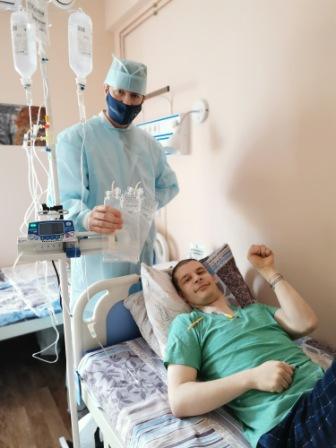
I would like to thank the entire team of the chemotherapy and bone marrow transplantation unit headed by Alexey Polushin.
Many thanks to Alexey Polushin for giving my son the opportunity to be treated.
Alexey Polushin is a very attentive, kind and intelligent doctor. It is a great happiness that we got to know him, because he is really good professional in his field. I also want to thank the head of the department of hematology Dr. Yuri Zalyalov, neurologist Kakoulina Evgeniya, hematologist Tsynchenko Alexander. It is very great that such wonderful, competent and caring people work exactly where they are most needed. With all my heart I wish you and your loved ones health and happiness!
We are also very grateful to the nurses for their kindness, patience and concern. Thank you all! Good luck to the whole team! Our treatment was successful! We will try to maintain this state for many years to come.
Best wishes,
Marina and Kirill Kalachovs
Germany, Fulda
June 15, 2021
Von ganzem Herzen möchte ich dem gesamten Team der Chemotherapie und Knochenmarkttransplantations Abteilung unter der Leitung von Dr. A. Polushin danken.
Vielen Dank an Dr. Alexei Polushin, dass er meinem Sohn die Möglichkeit gegeben hat, behandelt zu werden.
Dr. Polushin ist ein sehr aufmerksamer, höflicher, freundlicher und intelligenter Arzt.
Es ist einfach ein Glück, dass wir zu ihm gekommen sind, denn er ist wirklich ein Profi auf seinem Gebiet.
Ich möchte dem Leiter der Abteilung, dem Hämatologen Dr. Yuri Zalyalov, der Neurologin Dr. Kakoulina Yevgenia, dem Hämatologen Dr. Tsynchenko Alexander danken.
Es ist ein großes Glück, dass so wundervolle, kompetente und fürsorgliche Menschen genau dort arbeiten, wo sie am dringendsten gebraucht werden.
Von ganzem Herzen wünsche ich Ihnen und Ihren Familien Gesundheit und Glück!
Wir sind auch den Krankenschwestern und Krankenpflegern für ihre Freundlichkeit, Geduld und Fürsorge sehr dankbar. Vielen Dank an alle!
Dem ganzen Team viel Erfolg bei Ihrer schwierigen, aber edlen Arbeit! Unsere Behandlung war erfolgreich! Der Fortschritt wurde gestoppt !!!Wir werden versuchen, diesen Zustand für viele Jahre aufrechtzuerhalten.
Mit freundlichen Grüßen
Marina und Kirill Kalacov
Cermany,
Fulda, 15.06.2021

